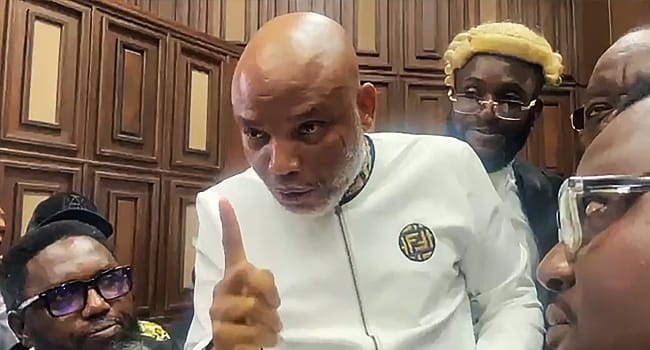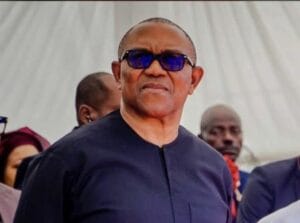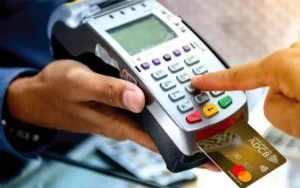The Federal High Court in Abuja has decided to move the trial of Nnamdi Kanu, leader of the Indigenous People of Biafra (IPOB), to the Department of State Services (DSS) headquarters.
This change, made on Friday by Justice James Omotosho, comes after the court said it needs to inspect a shipping container linked to Kanu. The government believes this container holds a radio transmitter used for broadcasts on Radio Biafra, the channel often associated with IPOB’s message.
According to the court documents, officials claim that the transmitter was brought into Nigeria secretly and used to promote the call for Biafra’s independence.
Why the Court Changed the Trial Venue
Justice Omotosho explained that moving the trial to the DSS facility is necessary for security reasons. The transmitter is currently being stored at the DSS headquarters, and the court feels it’s better to hold the trial there for easier inspection and tighter control.
“Due to the sensitive nature of the evidence and rising security concerns, we will now proceed at the DSS premises,” the judge ruled.
This decision highlights how serious the case has become and the level of attention it’s getting from the Nigerian security system.
What Charges Is Nnamdi Kanu Facing?
Nnamdi Kanu is facing several charges tied to terrorism and national security. These include:
- Allegedly inciting violence through IPOB’s activities
- Calling for the breakaway of the South-East region to form a new country called Biafra
- Operating a banned movement (IPOB was declared a terrorist group by the Nigerian government in 2017)
The Nigerian government says Kanu used Radio Biafra to encourage protests, resistance, and attacks on government institutions.
A Long Legal Battle
This case has been dragging on for years. Kanu was first arrested in 2015, then released on bail in 2017. But he fled Nigeria and didn’t return to court. In 2021, he was re-arrested and brought back to Nigeria under controversial circumstances.
Since then, he has been kept in the custody of the DSS in Abuja, and many court sessions have been delayed due to security and logistics issues.
His lawyers have often complained about his treatment, claiming he is being denied proper medical care and access to family.
IPOB Issues Fresh Warning: “Stop Linking Simon Ekpa to Kanu”
Meanwhile, IPOB has issued a strong warning to the public and media outlets: do not associate Simon Ekpa with Nnamdi Kanu.
In a statement released on Friday, the group said Simon Ekpa does not speak or act on behalf of Nnamdi Kanu. They stressed that Kanu is focused on peaceful and legal means to achieve Biafra and should not be blamed for actions carried out by others.
“Simon Ekpa is not representing our leader. Anyone connecting him to Kanu is spreading falsehood,” IPOB said.
This clarification comes after weeks of growing tension in the South-East, where sit-at-home orders and violent attacks have been reported. Ekpa, who claims to be a follower of Kanu, has been widely linked to many of these incidents, but IPOB insists these actions are not from them.
The Bigger Picture
Nnamdi Kanu’s trial has become more than just a courtroom issue. It reflects a bigger political and ethnic tension in Nigeria. Many in the South-East feel marginalised and say they are not treated fairly by the Nigerian government.
IPOB, which started as a peaceful movement, has grown into one of the most talked-about political groups in Nigeria. While the government calls it a terrorist group, many supporters see it as a voice for justice.
Now, with the trial moving to the DSS headquarters and pressure mounting from both local and international observers, all eyes are on what comes next.
Will the court finally deliver a verdict?
Will Nnamdi Kanu be freed or convicted?
And how will it affect the fragile peace in the region?
Conclusion
The decision to shift Nnamdi Kanu’s trial to the DSS office shows how serious and complex this case has become. It also signals that national security is at the center of this legal battle.
As the case continues, it will likely shape discussions on free speech, ethnic identity, and the future of Nigeria’s unity. IPOB’s warning about Simon Ekpa also adds a new twist, as the group tries to separate its official leadership from the growing violence blamed on unknown actors.



